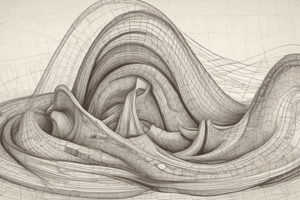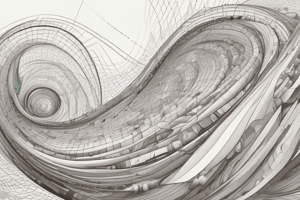Podcast
Questions and Answers
What does differentiation in calculus primarily deal with?
What does differentiation in calculus primarily deal with?
- Determining the area enclosed by a curve
- Finding rates of change and slopes (correct)
- Computing definite integrals
- Solving problems related to accumulation
Which two mathematicians are credited with the birth of calculus in the late 17th century?
Which two mathematicians are credited with the birth of calculus in the late 17th century?
- Sir Isaac Newton and Gottfried Wilhelm Leibniz (correct)
- Archimedes and Euclid
- Pierre-Simon Laplace and Pierre de Fermat
- Carl Friedrich Gauss and Leonhard Euler
What is the graphical representation used to analyze the rate of change at any specific point known as?
What is the graphical representation used to analyze the rate of change at any specific point known as?
- Position function (correct)
- Distance function
- Rate function
- Acceleration function
What does the integral symbol ( ext( extbf{ extit{int}})) denote in calculus?
What does the integral symbol ( ext( extbf{ extit{int}})) denote in calculus?
In calculus, what does integration empower us to compute?
In calculus, what does integration empower us to compute?
What does differentiation seek to find in terms of curves?
What does differentiation seek to find in terms of curves?
What concept in calculus involves adding up numerous thin slices based on their respective heights and widths?
What concept in calculus involves adding up numerous thin slices based on their respective heights and widths?
Which real-world application relies on calculus to track changes in position, velocity, or acceleration over time?
Which real-world application relies on calculus to track changes in position, velocity, or acceleration over time?
In economics, which mathematical tools are used to model consumer behavior and evaluate investment opportunities?
In economics, which mathematical tools are used to model consumer behavior and evaluate investment opportunities?
Which field explores the relationships between geometric properties of space and algebraic equations derived through calculus?
Which field explores the relationships between geometric properties of space and algebraic equations derived through calculus?
What challenge in calculus involves developing algorithms capable of solving increasingly intricate problems?
What challenge in calculus involves developing algorithms capable of solving increasingly intricate problems?
How do engineers leverage calculus in their work?
How do engineers leverage calculus in their work?
Flashcards are hidden until you start studying
Study Notes
Exploring Math: Calculus
Calculus is often considered the crown jewel of mathematics, offering insights into motion, change, and optimization with unparalleled precision. As you delve into this captivating field, let's explore its foundations and applications.
Origins and Concepts
The birthplace of calculus can be traced back to Sir Isaac Newton and Gottfried Wilhelm Leibniz during the late 17th century. This mathematical marvel focuses on two key concepts: differentiation, which deals with finding rates of change and slopes, and integration, which helps us find areas under curves and solve problems related to accumulation.
Let's consider differentiation first. To define it simply, we seek the slope of a curve at any specific point by taking derivative. For instance, if we want to determine how fast a ball rolls downhill at a certain instant, we look at the rate of change of its position function—the graphical representation of distance versus time plotted over time intervals becoming infinitesimally small.
Integration stands out as one of the most critical elements of calculus because it empowers us to compute definite integrals. Suppose you wish to know the area enclosed by a curve; you would integrate the function representing the curve. The integral symbol ((\int)) denotes integration, while antiderivatives represent primitive functions that help perform these calculations.
To illustrate integration, imagine measuring the water volume inside a container filled by pouring through a narrow tube whose cross-sectional shape remains constant. The process involves adding up numerous thin slices based on their respective heights and widths until reaching the desired limit. In essence, each slice approximates the concept of differential calculus being integrated.
Applications and Real World Examples
Many real-world phenomena depend upon principles from calculus, making our lives more convenient and predictable. A few examples follow:
- Motion and velocity: Euler's method applies calculus to track changes in position, velocity, or acceleration over time. An electric car's battery range estimation relies on such computational models.
- Modeling population growth: Using logistic regression allows scientists to forecast populations under various conditions.
- Engineering design: Engineers leverage calculus to calculate forces applied to structures, optimize designs, and ensure stability.
- Economics: Economists utilize derivatives and integrals to model consumer behavior, study market dynamics, and evaluate investment opportunities.
Challenges and Future Directions
For centuries, mathematicians have tackled complex challenges in calculus, expanding its applicability across diverse fields like physics, engineering, economics, computer science, and biology. Despite considerable progress, several ongoing debates concerning advances and refinements continue to emerge. Here are just a couple:
- Numerical analysis: Developing algorithms capable of solving increasingly intricate problems requires robust numerical methods grounded in sound theoretical frameworks.
- Differential geometry: This branch of topology explores relationships between geometric properties of space and corresponding algebraic equations derived through calculus.
In conclusion, understanding calculus opens doors to deeper mathematical exploration and fosters innovative solutions to countless practical issues. By mastering its techniques, we equip ourselves with tools for personal and professional growth, ultimately better comprehending our world around us.
Studying That Suits You
Use AI to generate personalized quizzes and flashcards to suit your learning preferences.




